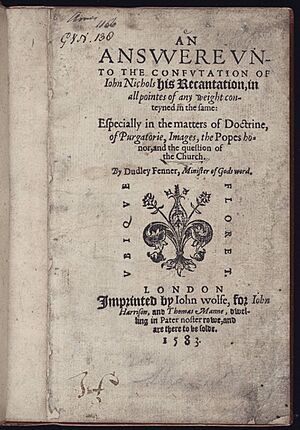Dudley Fenner facts for kids
Dudley Fenner (around 1558–1587) was an English puritan religious leader. He helped make a special way of thinking called "Ramist logic" popular in English. Fenner was also one of the first thinkers to use the term "covenant of works" to describe God's relationship with Adam in the Book of Genesis.
Dudley Fenner's Life
Dudley Fenner was born in Kent, England. He went to Peterhouse, Cambridge for his education. There, he became a follower of Thomas Cartwright. Fenner openly shared his presbyterian ideas. Because of this, he had to leave Cambridge without finishing his degree.
For a few months, he seemed to help the vicar of Cranbrook, Kent. However, it is not clear if he officially became a priest. Next, he followed Cartwright to Antwerp. There, he became a minister in the Reformed church. He then helped Cartwright for several years by preaching to the English people living there.
The leader of the church, Archbishop Grindal, was kind to Puritans. This encouraged Fenner to return to England. He became a curate (a type of assistant minister) in Cranbrook in 1583. But in the same year, he was one of seventeen ministers in Kent who were suspended. They refused to sign a document that agreed to the Queen's power and the rules of the Prayer Book.
Fenner was put in prison for a while. Later, he was set free. He spent the rest of his life as a chaplain in the Reformed church in Middelburg.
Fenner's Family
Dudley Fenner and his wife, Joan, had four daughters:
- More-fruit Fenner (died 1602)
- Free-gift Fenner (born before 1583, died September 1583)
- Faint-not Fenner (baptized 1585, died 1604)
- Well-abroad Fenner
Dudley Fenner's Writings
A list of Fenner's real works is in a book called Athenae Cantabrigienses by Cooper. His writings are considered some of the best explanations of Puritan ideas. His textbook, The Arts of Logic and Rhetoric, was a popular book about Ramist logic. It used parts of the Bible to show his theories. His most important work was Sacra theologia (Geneva, 1585).
 | Roy Wilkins |
 | John Lewis |
 | Linda Carol Brown |


